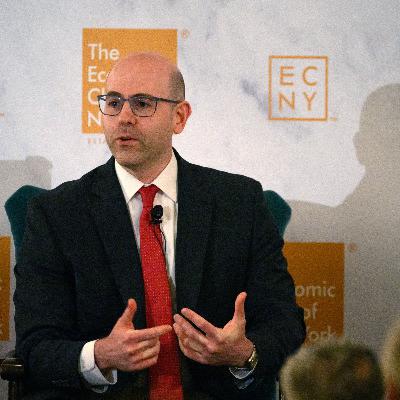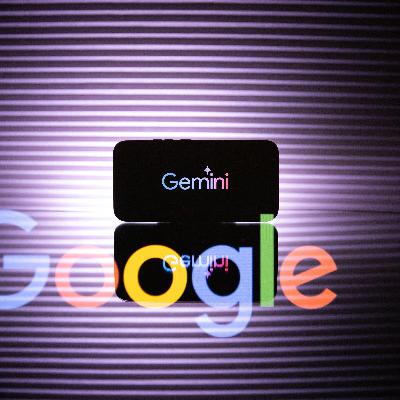Discover Marketplace
Marketplace

Marketplace
Author: Marketplace
Subscribed: 60,188Played: 4,814,546Subscribe
Share
© Copyright 2025 Minnesota Public Radio
Description
Every weekday, host Kai Ryssdal helps you make sense of the day's business and economic news — no econ degree or finance background required. "Marketplace" takes you beyond the numbers, bringing you context. Our team of reporters all over the world speak with CEOs, policymakers and regular people just trying to get by.
179 Episodes
Reverse
The government shutdown means crucial jobs data will likely be postponed, right as the Fed weighs its next move. Chicago Fed President Austan Goolsbee, a self-described “data dog,” tells us how central bank officials plan to pivot. He also discusses Fed independence, transitory inflation, and rate cut pacing. After that: fiscal calendars vary by sector, synthetic dye removal will ripple through the food chain, and ADP reports more sour employment data.Every story has an economic angle. Want some in your inbox? Subscribe to our daily or weekly newsletter.Marketplace is more than a radio show. Check out our original reporting and financial literacy content at marketplace.org — and consider making an investment in our future.
While the stock market appears unconcerned about potential red flags in this economy, the bond market's a bit more cautious. As Washington nears a shutdown and the labor market flags, Treasury yields are ticking down. But demand for those safer, long-term bonds hasn’t been uniform. Plus: Trump adds to existing tariffs on Canadian lumber, OpenAI wades into e-commerce waters, and Abha Bhattarai at the Washington Post talks about the “stuck economy.”Every story has an economic angle. Want some in your inbox? Subscribe to our daily or weekly newsletter.Marketplace is more than a radio show. Check out our original reporting and financial literacy content at marketplace.org — and consider making an investment in our future.
Pending home sales rose in August, boosted by a slight drop in mortgage rates. Overall, though, the market remains sluggish — owners don't want to give up their locked-in low rates and buyers are waiting to see if rates and other costs will cool. Also in this episode: Banks respond to the Fed rate cut, retailers prepare for holiday hiring, and tech companies hope nuclear is the answer to data center energy demand.Every story has an economic angle. Want some in your inbox? Subscribe to our daily or weekly newsletter.Marketplace is more than a radio show. Check out our original reporting and financial literacy content at marketplace.org — and consider making an investment in our future.
In August, Americans spent more than they made for the third month in a row. Thanks to tariff-induced price bumps, consumers are dipping into savings and using credit cards to keep up with their typical spending. In this episode, how long can consumers stay resilient? Plus: LA businesses prepare for ongoing ICE raids, a ski group vies to manage U.S. surfing at the 2028 Olympics, and an artist’s work changes in the age of e-commerce. Every story has an economic angle. Want some in your inbox? Subscribe to our daily or weekly newsletter.Marketplace is more than a radio show. Check out our original reporting and financial literacy content at marketplace.org — and consider making an investment in our future.
Turns out the economy grew faster than we initially thought in the second quarter of 2025. Between a slowing job market and uncertain trade policies, an upward revision to GDP came as a bit of a surprise. In this episode, a quick lesson on how GDP is calculated and why consumer spending drove the acceleration. Plus: Hiring-related text scams get more believable, the housing market stays stuck, and companies ramp up spending on durable goods.Every story has an economic angle. Want some in your inbox? Subscribe to our daily or weekly newsletter.Marketplace is more than a radio show. Check out our original reporting and financial literacy content at marketplace.org — and consider making an investment in our future.
Disney’s streaming platforms — Disney+, Hulu, and ESPN — will see price hikes come October 21. They aren’t alone. As the streaming wars escalate, companies have switched focus to profit over customer volume, while consumers whittle down their subscriptions. Also in this episode: A soybean farmer faces trade war realities, manufacturers pour cash into new equipment, and Warren Littlefield, producer of “Fargo," “The Handmaid’s Tale” and more discusses the TV business with Kai.Every story has an economic angle. Want some in your inbox? Subscribe to our daily or weekly newsletter.Marketplace is more than a radio show. Check out our original reporting and financial literacy content at marketplace.org — and consider making an investment in our future.
Newly appointed Fed governor Stephen Miran has argued the federal funds rate should be a full two percentage points lower than its current level. A major cut like that could lower bond yields and reduce borrowing costs, spurring spending. But longer-term, inflation would likely balloon. After that: Auto dealers face new obstacles as EV tax credits end, a traveling nurse navigates frequent moves, and U.S. economic growth is “more resilient than expected," according to an OECD report.Every story has an economic angle. Want some in your inbox? Subscribe to our daily or weekly newsletter.Marketplace is more than a radio show. Check out our original reporting and financial literacy content at marketplace.org — and consider making an investment in our future.
Economic data reports tell us two things are true: Inflation seems here to stay, and consumers haven’t let up on spending. It’s the perfect storm for businesses to wield the power to raise prices without losing customers. What could tip the scale in the other direction? Also in this episode: GOP-led changes to the H-1B visa program could hurt U.S. businesses long-term, home sellers are cautious as supply dwindles, and the new farm bill faces familiar obstacles.Every story has an economic angle. Want some in your inbox? Subscribe to our daily or weekly newsletter.Marketplace is more than a radio show. Check out our original reporting and financial literacy content at marketplace.org — and consider making an investment in our future.
Google announced it will integrate Gemini, its AI assistant, into the Chrome web browser. That will transform Chrome — the most used search engine — into an “agentic” browser. More on what that means for your data privacy and the race to advance AI tech, in this episode. Plus: Independent craft stores aim to fill the void left by Jo-Ann Fabrics, and how feeding the 82% of Alaskan communities that don’t have road access is a feat of public infrastructure.Every story has an economic angle. Want some in your inbox? Subscribe to our daily or weekly newsletter.Marketplace is more than a radio show. Check out our original reporting and financial literacy content at marketplace.org — and consider making an investment in our future.
The number of new hires in August was about equal to the number of Americans who lost or quit their jobs in the same month. That means they sorta just .... cancel each other out. In this episode, what’s causing this strange stagnation? Plus: Bank of America and Amazon are raising their minimum pay, the U.S.-China trade war has soy and sorghum farmers worried, and a Seattle mall caters to and celebrates plus-size shoppers.Every story has an economic angle. Want some in your inbox? Subscribe to our daily or weekly newsletter.Marketplace is more than a radio show. Check out our original reporting and financial literacy content at marketplace.org — and consider making an investment in our future.
The top 10% of earners in the U.S. accounted for nearly 50% of spending in the second quarter — the highest share since Moody's Analytics began collecting the data in 1989. That's important context, as consumer spending keeps climbing despite tariffs and a grim labor market. In this episode, what it all says about our economy. Plus: Homeowners rush to refinance as rates fall, hydropower escapes GOP cuts to clean energy, and Etsy sellers struggle as tariffs raise costs.Every story has an economic angle. Want some in your inbox? Subscribe to our daily or weekly newsletter.Marketplace is more than a radio show. Check out our original reporting and financial literacy content at marketplace.org — and consider making an investment in our future.
Wyoming made billions from coal mining over the last 50 years, funding the government, schools, roads, parks. But President Trump’s major spending bill, passed in July, gives mining companies a break on royalty fees — leaving state budgets lean. In this episode, easing coal fees comes at a price. Plus: Non-store retail spending saw double-digit year-over-year growth, small businesses suffer as they wait for tariff clarity, and stock investors basically ignore all the bad economic headlines.Every story has an economic angle. Want some in your inbox? Subscribe to our daily or weekly newsletter.Marketplace is more than a radio show. Check out our original reporting and financial literacy content at marketplace.org — and consider making an investment in our future.
It’s been five-and-a-half years since lots of workers retreated to home offices at the height of the pandemic. Now, about 35% of Americans work from home at least once a week. In this episode, why employers’ demands to "return to office" are growing. Plus: A sociologist expresses concern about AI’s long-term effects on the American labor market, import prices reflect an uptick in “undervaluation,” and President Trump wants reduce earnings report requirements for public firms.Every story has an economic angle. Want some in your inbox? Subscribe to our daily or weekly newsletter.Marketplace is more than a radio show. Check out our original reporting and financial literacy content at marketplace.org — and consider making an investment in our future.
The Russell 2000, a stock index of smaller companies or “small caps,” has fallen behind the S&P 500 over the past few years. A Fed rate cut, which may come as soon as next week, could change their luck. In this episode, why interest rates have an outsize effect on smaller companies. Plus: Homebuilding is harder under President Trump’s tariffs and immigration policies, brands lean into the power of scent, and we recap the week’s economic headlines.Every story has an economic angle. Want some in your inbox? Subscribe to our daily or weekly newsletter.Marketplace is more than a radio show. Check out our original reporting and financial literacy content at marketplace.org — and consider making an investment in our future.
The labor market has been cooling for a bit, and in some sectors is virtually frozen. That could push the Federal Reserve to cut interest rates. But the Fed’s other mandate, besides maximum employment, is price stability. And inflation is picking up. What to do, what to do…. Later in this episode: Why are utilities costs up? Are restaurants hiring when no one else is? And, should retirement accounts have access to private equity funds?Every story has an economic angle. Want some in your inbox? Subscribe to our daily or weekly newsletter.Marketplace is more than a radio show. Check out our original reporting and financial literacy content at marketplace.org — and consider making an investment in our future.
Consumer prices have been overall slow to reflect the Trump administration’s new tariffs. So we called up some retailers to understand why they haven’t raised their prices, even though their costs are higher. It turns out, bumping up prices isn’t as easy as pushing a button — and can come with consequences. Also in this episode: Bond yields tell us where the economy’s headed, volatile categories can have an outsize impact on the PPI, and a new book investigates the “double tax” Black women face.Every story has an economic angle. Want some in your inbox? Subscribe to our daily or weekly newsletter.Marketplace is more than a radio show. Check out our original reporting and financial literacy content at marketplace.org — and consider making an investment in our future.
Budget cuts may be in the Bureau of Labor Statistics' future. But the data collected by the BLS is critical for federal decision making. In this episode, we calculate if the $700 million investment is worthwhile. Plus: Firms that spend the most on AI slash tons of jobs, economic uncertainty drives up the price of gold, and mortgage rates fall — which is good for buyers but a bad sign for the overall economy.Every story has an economic angle. Want some in your inbox? Subscribe to our daily or weekly newsletter.Marketplace is more than a radio show. Check out our original reporting and financial literacy content at marketplace.org — and consider making an investment in our future.
China's exports to the U.S. are down a third year over year. That’s a significant drop, reflective of President Trump’s punishing tariff agenda. Although China’s overall export growth has slowed, it still rose 4.5% in August — thanks, in part, to strategic redirection to new markets. In this episode, what the U.S. stands to lose by cutting off China as a trade partner. Plus: Luxury brands remain mostly insulated from economic uncertainty and fintech firm Robinhood prepares to join the S&P 500.Every story has an economic angle. Want some in your inbox? Subscribe to our daily or weekly newsletter.Marketplace is more than a radio show. Check out our original reporting and financial literacy content at marketplace.org — and consider making an investment in our future.
Paltry job creation was the headline item in the latest jobs report. But dig a little deeper, and warning signs show up all over: long-term unemployment, Black unemployment and Hispanic unemployment all rose in August. In this episode, why those stats could be proverbial canaries in the coal mine of the broader labor market. Plus: Industrial warehouse demand is down and a shipworker shortage could thwart Trump’s goal of reviving the commercial shipping industry.Every story has an economic angle. Want some in your inbox? Subscribe to our daily or weekly newsletter.Marketplace is more than a radio show. Check out our original reporting and financial literacy content at marketplace.org — and consider making an investment in our future.
The Federal Reserve Board of Governors has gotten a lot of attention lately — President Trump is attempting to remove one member and has nominated another. But there’s more under the central bank umbrella than president-appointed officials. In this episode, we break down why regional Fed banks and Fed presidents matter. Plus: The latest Beige book shows an uptick in lending, shipping costs are down and an economist walks us through her process for reading a CPI report.Every story has an economic angle. Want some in your inbox? Subscribe to our daily or weekly newsletter.Marketplace is more than a radio show. Check out our original reporting and financial literacy content at marketplace.org — and consider making an investment in our future.



























TDS?
TDR?
I guess tugboats were not needed to prevent bridge damage.
All that discussion of Trump's meme coin with no mention of Trump's personal ownership and control of a large quantity of them? No mention of the unlimited opportunity for untraceable bribes and grift? No mention of Trump's documented history of shakedowns for favorable treatment?
I have been using the business consumer reviews site for quite some time now, and I must say, it has been a game-changer for me. The user-friendly interface makes it incredibly easy to navigate and find the information I need. The reviews are detailed and informative, giving me a clear picture of what to expect from a particular business, for more information visit and read https://www.pissedconsumer.com/ . I appreciate the transparency and honesty of the reviews, as it helps me make informed decisions when choosing where to spend my money. Overall, my experience with this site has been nothing short of excellent, and I highly recommend it to anyone looking for reliable and trustworthy business reviews.
2025 could be the year of small AI as advancements in efficiency, scalability, and accessibility make it easier for businesses and individuals to harness AI's potential on a smaller scale. Exciting times ahead!
$100 Registration Bonus Eksklusibo sa jet!
Maging Miyembro ng daddy at Makatanggap ng $100 Agad!
Magsimula sa fresh: Makakuha ng $100 Welcome Bonus!
Magsimula sa fresh: Makakuha ng $100 Welcome Bonus!
sherbet Registration Bonus: Libreng $100 Para sa Mga Bagong User!
Magparehistro sa supernova at Makakuha ng $100 Bonus Kaagad!
Magparehistro sa supernova at Makakuha ng $100 Bonus Kaagad!
Sumali sa jazz Ngayon at Kumuha ng $100 Welcome Bonus!
Sumali sa jazz Ngayon at Kumuha ng $100 Welcome Bonus!
Simulan ang Iyong Paglalaro sa 500 casino na may Libreng $100 Bonus!
$100 Bonus Agad Para sa Mga Bagong User ng highway!
Bagong User? Sumali sa sol at Makatanggap ng $100 Bonus!
Makakuha ng $100 Bonus Kapag Nagparehistro sa exclusive Ngayon!
Climate change. It didn:'t help setting 3 fires to spontaneously grow and take advantage of the Santa Ana winds to bring the housing lots back on the market, and then hint that multiple family housing should replace all of those private homes.Forcing sell-off of obviously damaged property to those that can profit buy rebuilding, and maybe Miami highrise style that corporations own, and not the cozy wannabes that just think of themselves. How dare they. Think huge glass towers. Miami 2.0